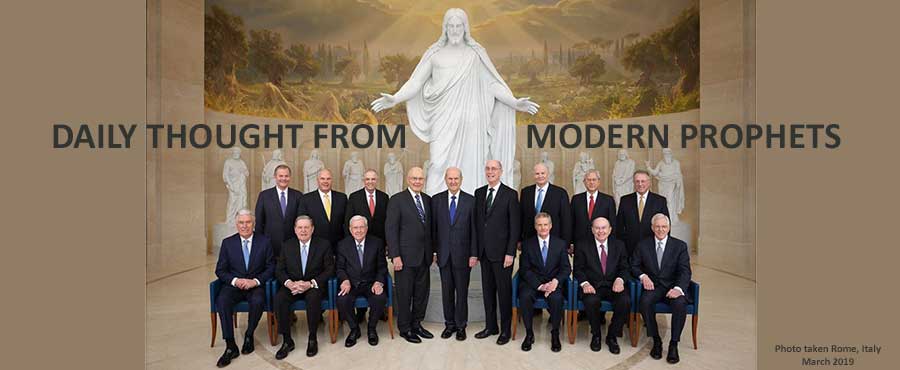Elder Bruce R. McConkie (July 29, 1915–April 19, 1985) served as a Seventy from 1946-1972 when he was called to the Quorum of Twelve. He served in that assignment until his death from cancer at age 69.
"If we build our house of salvation on the rock of personal revelation, if we build it on the revealed reality that Jesus is the Lord, if we build it on him who is the Eternal Rock—it will stand forever.
"If we are guided by the spirit of inspiration while here in mortality, we will be able to withstand all of the floods and storms that beat upon us.
"If we are founded upon a rock, we worship the Father in the name of the Son by the power of the Holy Ghost.
"If we are founded upon a rock, we know that salvation comes by the grace of God to those who believe the gospel and keep the commandments.
"If we are founded upon a rock, we forsake the world, flee from carnal things, and live upright and godly lives.
"If we are founded upon a rock, the gates of hell shall not prevail against us. As long as we remain in our house of faith, we shall be preserved when the rains of evil fall, when the winds of false doctrine blow, and when the floods of carnality beat upon us.
"Thanks be to God that we, as Latter-day Saints, are founded upon a rock. And so it is that the faithful among us hear a calm voice of quiet certainty saying: 'If ye shall build up my church, upon the foundation of my gospel and my rock, the gates of hell shall not prevail against you....
"'Behold, you have my gospel before you, and my rock, and my salvation.' (D&C 18:5, 17.) ...
"God grant that we may be true to Him by whose name alone salvation comes. He is our Friend, our Lord, our King, our God, and our Rock."
- Bruce R. McConkie, "Upon this Rock," General Conference April 1981
Click here to read or listen to the full talk
Elder McConkie had the gift of boldly and confidently declaring the doctrine of the Restoration, and this is a good example of that. He described "the rock of personal revelation" as one of the great keys to a successful life:
The Lord promised that "the gates of hell shall not prevail against you" when we are built on the Rock of our Redeemer. Certainly that applies to our ultimate destiny in eternity, but Elder McConkie's witness is that it also applies to this life and its challenges. We can truly find safety and peace through Him.
(Compilation and commentary by David Kenison, Orem, Utah, 2018)

































